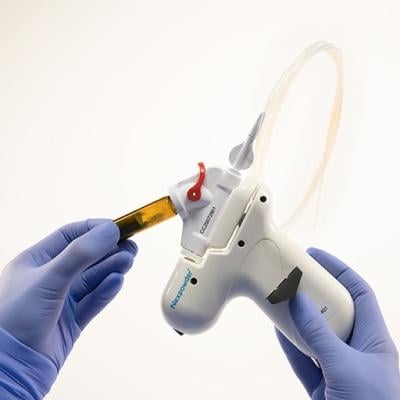Every year in the U.S., doctors perform more than 1 million endoscopic hemostasis procedures to treat gastrointestinal bleeding, the majority of which are upper GI bleeds. One popular treatment method relies on catheter-based hemostatic sprays, which cover a bleeding site in a powder coating to stanch the bleed and speed up the clotting process but which can quickly become clogged and may be difficult to navigate through the GI tract.
Aiming to avoid those issues with its own entry in the hemostatic spray market is Medtronic, which announced Wednesday the FDA clearance of its Nexpowder system. It’s indicated specifically to treat bleeding in the upper GI system not linked to varices—dilated veins often found in the esophagus.
Medtronic’s version of the treatment is designed with a powder-coating technology that’s meant to minimize clogging in the delivery catheter and with a highly targeted delivery system that gives doctors total control over the placement of the powder and results in minimal particle scattering.
“It makes this technology a lot more appealing for use in GI bleeding cases, whereas in the past other hemostatic powders were viewed as a Hail Mary type of device because they were so inconvenient and cumbersome to use,” Austin Chiang, M.D., chief medical officer of the Medtronic’s gastrointestinal business, told Fierce Medtech in an interview. “That’s really what we’re getting at: We think this is potentially going to be something that can be used for first-line treatment and not as a last resort.”
The Nexpowder system includes a hand-held spray controller that connects to a catheter. Once the bright blue powder is sprayed onto a bleeding site, it reacts with the blood to form a gel with nearly twice the adhesive force of other currently available hemostatic sprays, according to Medtronic.

The resulting adhesive patch acts as a physical barrier atop an upper GI bleed. Not only does it stanch potential hemorrhages, it also blocks the loss of other body fluids and can prevent contamination at the wound site.
The gel stays in place for only a short time, degrading within one to three days. In that time, studies have shown that the Nexpowder system leads to immediate hemostasis in at least 94% of cases.
Meanwhile, as few as 3.7% of patients experience rebleeding within a month after the powder-to-gel substance is applied, well below the approximately 20% of upper GI bleeds that typically result in rebleeding.
Additionally, unlike other hemostatic sprays, Medtronic’s adheres to all types of moisture, not just blood, which the company said opens the door for it to be used in a variety of clinical applications beyond active bleeding.
“We’re addressing issues that clinicians and patients are facing directly. With some of the difficulties that we’ve had in other hemostatic technologies—this is a way to actually overcome them and not just replicate what’s already out there,” Chiang said. “We really see Nexpowder as a unique tool that differs from what’s currently available.”
The Nexpowder system “fits perfectly with our vision to empower our gastroenterologist customers across the U.S. to take ownership of some of these challenges and find solutions with a meaningful and very powerful technology,” Gio Di Napoli, president of Medtronic’s gastrointestinal business, told Fierce Medtech.
Beyond the hemostatic spray, he noted, the company’s existing GI device lineup includes GI Genius, an artificial-intelligence-powered system to spot potentially cancerous polyps in colonoscopy videos, and ProdiGI, a line of surgical tools used to remove those lesions.